DM12
The compact DM12 honours yourstage or studio desktop space,while providing incredible sonicperformance, amazing versatility � andan unheard of level of affordability.
What is the secret behind DM12’ssuperb, studio-quality sound? TheDM12 features 8 award-winning,Midas microphone preamplifi ers withtrue +48 V Phantom Power, acclaimedby audio engineers the world over for their transparency and nuancedlow noise, high-headroom design. Add to this TRS Line Inputs on all 12channels (8 mono and 2 stereo), mono channel Inserts and 3-band EQ withmid-frequency sweep, 2 switchable pre/post-fader aux sends, 2 monitorouts and 2-track RCA I/O, and you have an analogue work of art � the fullyfeatured DM12!
Live Performance and Studio Recording
Live Performance and Studio Recording
With 12 channels, the DM12 has more than enough microphone and line inputs to manage a small band or worship team with channels to spare – both on the stage and in the studio. It is also the ideal choice for use as a keyboard or drum sub-mixer for larger scale performances.
Dedicated Stereo Inputs
Dedicated Stereo Inputs
Line channels 9/10 – 11/12 are dedicated stereo channels, making them ideal for stereo instruments, such as keyboards – and can also be used for mono signals thanks to a convenient balance control on each 2-channel grouping. These channels can also be used as return inputs for signals sent external effects processing equipment.
Sublimely Musical British EQ
Sublimely Musical British EQ
The British consoles of the 1960s and ‘70s changed the sound of rock and roll – without them the British Invasion might not have happened. Those legendary mixing desks soon became the envy of engineers and producers all over the world. The 3-band channel EQ on our DM12 mixers is based on that very same circuitry, allowing you to imbue signals with incredible warmth and detailed musical character. The sweepable mid-frequency band provides a broad tonal palette with which to finetune the ideal signal. Even when applied generously, these equalizers exhibit sweet forgiveness and superb audio quality.
Dual Aux Sends
Dual Aux Sends
The DM12 is also equipped with 2 aux sends with pre/post fader switching for added versatility. Users can select to use them for external effects processing, custom monitor mixes, or a combination of the two. Additional monitoring outputs are provided of the main mix for stage or studio monitor applications.
Classic Precision
Classic Precision
All of DM12 mixer’s 60 mm faders have been carefully designed to provide a long life of highly precise level setting, ensuring repeatable and flawless performance for many years to come.
Quality is Job #1
Quality is Job #1
While some manufacturers cut quality when they design small mixers, we understand that every mixer should provide uncompromising performance and a robust feature set. The very embodiment of quality, from its rugged construction and top-of-the-range components to that unmistakable Midas sound – the DM12 is a truly professional audio console.
Value
Value
No matter what your audio mixing needs, the DM12 provides the performance and features required to take your talent to the next level, at a price that is custom-tailored for the budget-savvy user. Professional sound quality, our legendary Midas mic preamps, 3-band EQs with sweepable mids, and much more make the DM12 mixer ideal for both your live gigs and recording. Try one out today, or feel free to order yours online.
Architecture & Engineering Specifications
The audio mixing console shall be an analogue design suitable for use in live performance and studio recording, and equipped with 8 MIDAS microphone preamplifiers.
The mixing console shall have 8 mono channels, and each shall provide the following: 1 balanced XLR microphone input, 1 balanced ¼ ” TRS line level input, and a ¼ ” TRS Insert. A gain control shall provide adjustment of the input signal from 10 to 60 dB (mic) and -10 to +40 dB (line). An EQ treble control shall provide a range of 15 dB of boost and cut of shelving EQ at 12 kHz. An EQ mid control shall provide a range of 15 dB of boost and cut, and a mid-sweep control shall provide peak EQ adjustment from 150 Hz to 3.5 kHz. An EQ bass control shall provide a range of 15 dB of boost and cut of shelving EQ at 80 Hz. Aux 1 and Aux 2 controls shall provide adjustment of the Auxiliary 1 and 2 outputs from 0 to +10 dB. A pan control shall position the mono channel in the mix.
A PFL (pre fader listen) switch shall allow the channel signal to be soloed and routed to the master meters, monitors, and headphones. A mute switch shall be provided to mute the channel, and a peak LED shall indicate channel signal overloading. A 60 mm mono channel fader shall allow adjustment of the channel level in the mix.
The mixing console shall have 2 stereo channels, and each shall provide the following: 2 balanced ¼ ” TRS line level inputs. A stereo gain control shall provide adjustment of the input signal from -20 to +20 dB. An EQ treble control shall provide a range of 15 dB of boost and cut of shelving EQ at 12 kHz. An EQ bass control shall provide a range of 15 dB of boost and cut of shelving EQ at 80 Hz. Aux 1 and Aux 2 controls shall off er adjustment of the Auxiliary 1 and 2 outputs from 0 to +10 dB. A balance control shall position the stereo channels in the mix. A PFL (pre fader listen) switch shall allow the channel signal to be soloed and routed to the master meters, monitors, and headphones. A mute switch shall be provided to mute the channel, and a peak LED shall indicate channel signal overloading. A 60 mm stereo channel fader shall allow adjustment of the channel levels in the mix. The mixing console shall be provided with 2 balanced ¼ ” TRS Auxiliary outputs. Each mono and stereo channel shall have an Aux 1 and Aux 2 level control. Each Aux output shall be provided with a pre-fader/post-fader switch.
The mixing console shall be provided with 2 balanced ¼ ” TRS monitor outputs. Level adjustment shall be provided with a local level control. The output shall be a copy of the main mix, or the pre-fader output from any soloed channels (channel PFL switch engaged), or the 2 track input.
The mixing console shall be provided with 2 unbalanced RCA line level inputs, and 2 switches shall allow the input signals to be routed to the main mix, or to the monitor outputs. There shall be 2 unbalanced RCA line level outputs to allow the main mix to be recorded.
The mixing console shall be provided with 1 stereo ¼ ” TRS output for headphone monitoring of the main mix, or soloed channels (channel PFL switch engaged). Level adjustment shall be provided by a Phones level control.
The mixing console shall be provided with 2 balanced XLR outputs to send out the final left/right mix to external amplifiers and equipment. Adjustment of the final mix output shall be provided by 2x 60 mm master faders. 2 ¼ ” TRS main out insert jacks shall be provided.
Global 48 Volt phantom power shall be provided to each microphone input via a phantom power switch. A +48V LED shall indicate when phantom power is activated.
2 LED ladders shall indicate the levels of the main mix, or soloed channels (channel PFL switch engaged). An LED will indicate when the mixer is powered on, and a PFL LED will indicate when the meters are monitoring soloed channels.
The mixing console shall be provided with an internal switch mode power supply, capable of operation at AC voltages ranging from 100 to 240 VAC, at 50/60 Hz. The mains connection shall be a standard IEC receptacle.
The mixing console dimensions shall be 95 mm high x 328 mm wide x 370 mm deep (3.7 x 12.9 x 14.6″). The nominal weight shall be 3.9 kg (1.8 lbs).
The mixing console shall be the MIDAS DM12. No other mixing console shall be acceptable unless submitted data from an independent test laboratory verifies that the above combined performance / size specifications are equalled or exceeded.
Architecture & Engineering Specifications
The audio mixing console shall be an analogue design suitable for use in live performance and studio recording, and equipped with 12 Midas microphone preamplifiers.
The mixing console shall have 8 mono channels, and each shall provide the following: 1 balanced XLR microphone input, 1 balanced ¼ ” TRS line level input, and a ¼ ” TRS Insert. A gain control shall provide adjustment of the input signal from 10 to 60 dB (mic) and -10 to +40 dB (line). An EQ treble control shall provide a range of 15 dB of boost and cut of shelving EQ at 12 kHz. An EQ mid control shall provide a range of 15 dB of boost and cut, and a mid-sweep control shall provide peak EQ adjustment from 150 Hz to 3.5 kHz. An EQ bass control shall provide a range of 15 dB of boost and cut of shelving EQ at 80 Hz. Aux 1 and Aux 2 controls shall provide adjustment of the Auxiliary 1 and 2 outputs from 0 to +10 dB. A pan control shall position the mono channel in the mix. A PFL (pre fader listen) switch shall allow the channel signal to be soloed and routed to the master meters, monitors, and headphones. A mute switch shall be provided to mute the channel, and a peak LED shall indicate channel signal overloading. A 60 mm mono channel fader shall allow adjustment of the channel level in the mix.
The mixing console shall have 2 stereo channels, and each shall provide the following: 2 balanced ¼ ” TRS line level inputs. A stereo gain control shall provide adjustment of the input signal from -20 to +20 dB. An EQ treble control shall provide a range of 15 dB of boost and cut of shelving EQ at 12 kHz. An EQ bass control shall provide a range of 15 dB of boost and cut of shelving EQ at 80 Hz. Aux 1 and Aux 2 controls shall off er adjustment of the Auxiliary 1 and 2 outputs from 0 to +10 dB. A balance control shall position the stereo channels in the mix. A PFL (pre fader listen) switch shall allow the channel signal to be soloed and routed to the master meters, monitors, and headphones. A mute switch shall be provided to mute the channel, and a peak LED shall indicate channel signal overloading. A 60 mm stereo channel fader shall allow adjustment of the channel levels in the mix.
The mixing console shall be provided with 2 balanced ¼ ” TRS Auxiliary outputs. Each mono and stereo channel shall have an Aux 1 and Aux 2 level control. Each Aux output shall be provided with a pre-fader/post-fader switch.
The mixing console shall be provided with 2 balanced ¼ ” TRS monitor outputs. Level adjustment shall be provided with a local level control. The output shall be a copy of the main mix, or the pre-fader output from any soloed channels (channel PFL switch engaged), or the 2 track input.
The mixing console shall be provided with 2 unbalanced RCA line level inputs, and 2 switches shall allow the input signals to be routed to the main mix, or to the monitor outputs. There shall be 2 unbalanced RCA line level outputs to allow the main mix to be recorded.
The mixing console shall be provided with 1 stereo ¼ ” TRS output for headphone monitoring of the main mix, or soloed channels (channel PFL switch engaged). Level adjustment shall be provided by a Phones level control.
The mixing console shall be provided with 2 balanced XLR outputs to send out the fi nal left/right mix to external amplifi ers and equipment. Adjustment of the fi nal mix output shall be provided by 2x 60 mm master faders. 2 ¼ ” TRS main out insert jacks shall be provided.
Global 48 Volt phantom power shall be provided to each microphone input via a phantom power switch. A +48V LED shall indicate when phantom power is activated.
2 LED ladders shall indicate the levels of the main mix, or soloed channels (channel PFL switch engaged). An LED will indicate when the mixer is powered on, and a PFL LED will indicate when the meters are monitoring soloed channels.
The mixing console shall be provided with an internal switch mode power supply, capable of operation at AC voltages ranging from 100 to 240 VAC, at 50/60 Hz. The mains connection shall be a standard IEC receptacle. The mixing console dimensions shall be 95 mm high x 328 mm wide x 370 mm deep (3.7 x 12.9 x 14.6″). The nominal weight shall be 3.9 kg (1.8 lbs).
The mixing console shall be the DDA DM12. No other mixing console shall be acceptable unless submitted data from an independent test laboratory verifi es that the above combined performance / size specifi cations are equalled or exceeded.
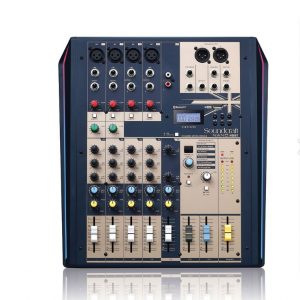
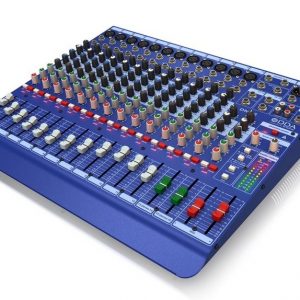
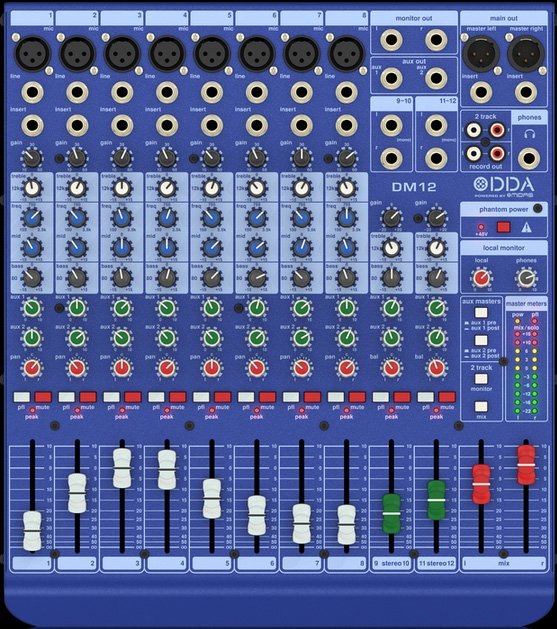

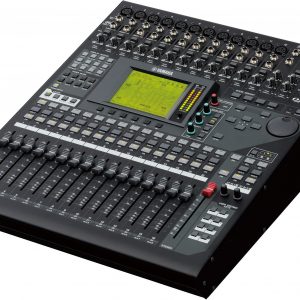
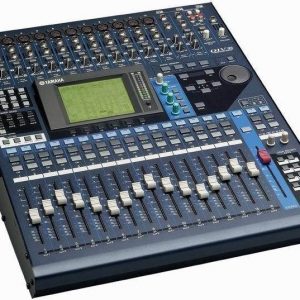
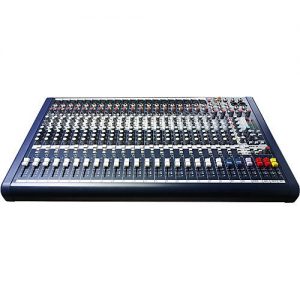
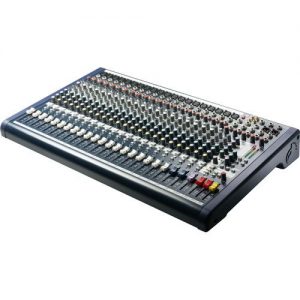
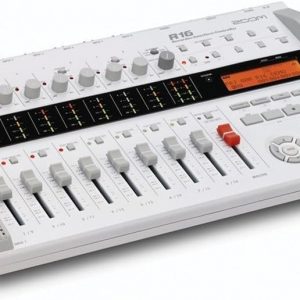


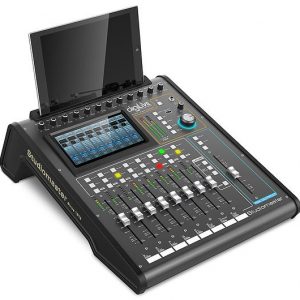
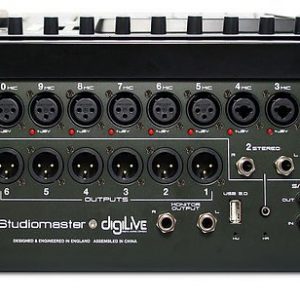
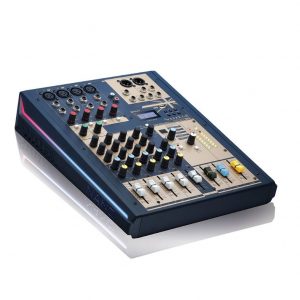
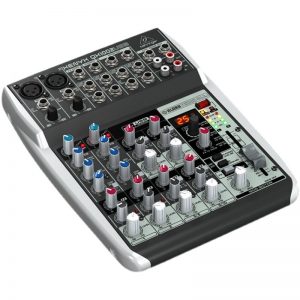
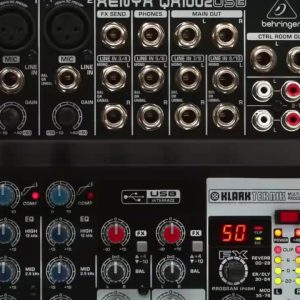
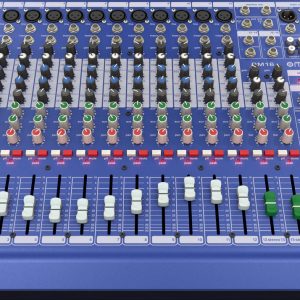
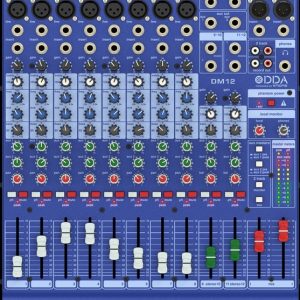


Reviews
There are no reviews yet.